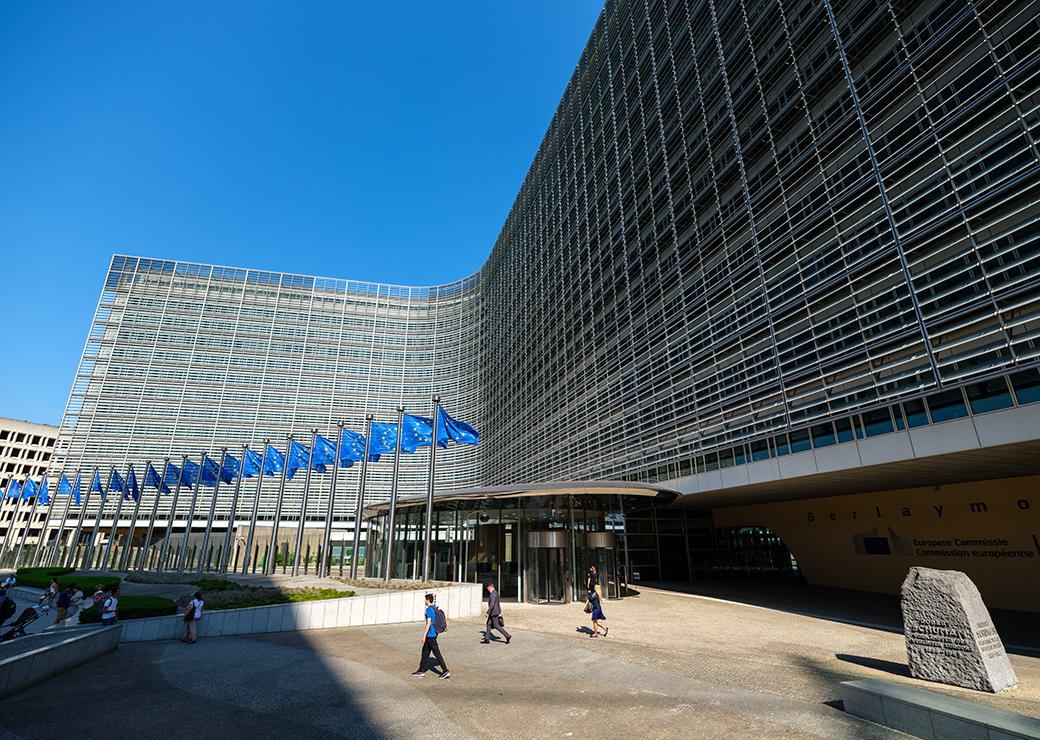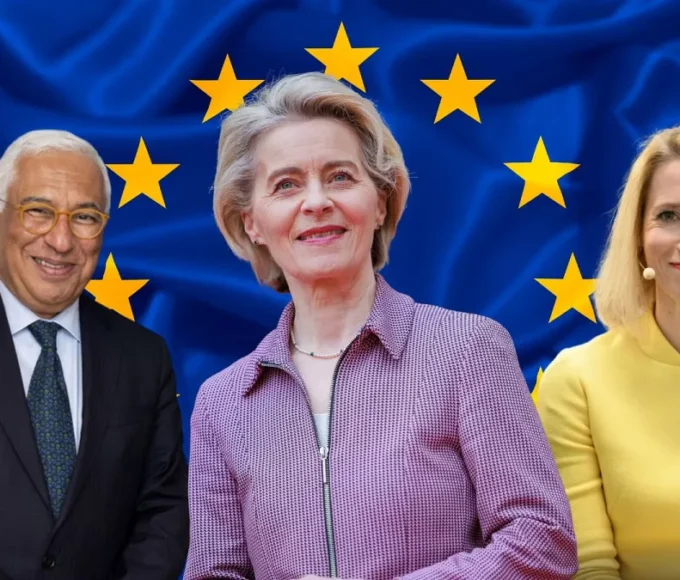While the Covid crisis and then the invasion of Ukraine have greatly disrupted its agenda, the European Commission will try to push the fires in the coming months so that “its” main texts can be adopted before the European elections next June. The year promises to be all the more difficult as the European economic sky is darkening (inflation, debt, threat of recession, etc.) and as the divisions between the Member States have perhaps never been greater, including – and particularly – within the Franco-German duo.
As the electoral deadline is fast approaching – the elections of European parliamentarians will take place from June 6 to 9, 2024 – the European Commission is working hard to ensure that “its” texts – in particular those of the green pact – are definitively adopted. An eagerness all the greater as the current Commission fears that the voters will bring to Strasbourg elected officials who are much less favorable to the line taken so far. “The traditional political balances have a good chance of being upset”, predicts Pascale Joannin, director of the Robert-Schuman foundation, in a note dated June 12. Piece of choice, the final adoption of the climate package “Fit for 55” is however more than on the right track (see our article of July 27), since the provisional agreement on the directive on renewable energies (known as RED III ) found in March (see our article of March 31) was finally made official on June 16 by Coreper, after having been blocked by France for a time. On the other hand, the road is still long for certain emblematic texts, but far from achieving unanimity, like the regulation on the restoration of nature, which was almost removed from the agenda by the Swedish presidency and which does not was voted in by Parliament by a hair’s breadth, in a heavily watered down version (see our July 12 article).
One crisis can hide another
It must be said that the Von der Leyen Commission was not spared by events. After the Covid, the invasion of Ukraine by Russia – and particularly its consequences in terms of energy – has greatly disrupted its roadmap. Admittedly, the Commission has argued that the energy crisis in no way calls into question the energy transition it promotes, but on the contrary reinforces the need for it. The fact remains that in recent months, the Union has in particular had to work on the REPowerEU plan, which aims in particular to get out of dependence on fossil fuels (see our article of May 18, 2022), and its integration into the national recovery plans (see our article of June 28, 2023). It has also seen the issue of sovereignty come back strongly, not without upsetting some of its objectives, particularly in the food industry. Pushed by certain Member States, including France and Spain (see our article of January 6), it still had to launch the review of the electricity market (see our article of March 20). It is also forced to organize the response to sharp global competition, a phenomenon that it has itself fueled (see our article of February 13). It is difficult to make progress on these latter texts, given the great differences of opinion between the Member States. While the Council thus adopted its negotiating position on the proposal for a regulation on the integrity and transparency of the wholesale energy market (known as Remit) on June 19, the other aspects of the reform of the energy market electricity are still open. The Spanish presidency hopes to close the file before Christmas and Minister Teresa Ribera pledged, during the informal meeting of energy ministers in Valladolid in mid-July, to submit a new proposal “as soon as possible”.
The European Union, how many divisions?
While the war in Ukraine has highlighted the Union’s weakness in terms of defence, the last few months have above all underlined how many sources of division there are between the 27 – “values” (which prevent Poland from benefiting from its recovery plan) to Russian gas, via state aid or nuclear power. The “Franco-German engine” was far from spared. While for a time we thought it was relaunched (see our article of January 24), the last few weeks have shown how fragile it was (see our article of March 28). “The accumulation of disputes between the two countries is coming to light. Energy policy, defence, economic and monetary policy, environmental, everything seems to be pushing the two main European economies away”, recently observed Jean-Dominique Giuliani, who chairs the Robert – Schumann. In addition to a certain tendency to go it alone, denounced bluntly(Outgoing link, new window) recently by MP François-Xavier Bellamy to Chancellor Olaf Scholz, it must be admitted that Germany has multiplied the reversals, that this either on the ban on the sale of new thermal vehicles in 2035 or on the principle of technological neutrality in the energy mix (see our article of February 2). Nuclear power undoubtedly remains the main stumbling block (see our article of March 29), and France must fight for each text to impose it, with more or less success. A new “block war” is thus taking shape within the Union itself. On the one hand, it opposes the “nuclear alliance”, carried by the
As the electoral deadline is fast approaching – the elections of European parliamentarians will take place from June 6 to 9, 2024 – the European Commission is working hard to ensure that “its” texts – in particular those of the green pact – are definitively adopted. An eagerness all the greater as the current Commission fears that the voters will bring to Strasbourg elected officials who are much less favorable to the line taken so far. “The traditional political balances have a good chance of being upset”, predicts Pascale Joannin, director of the Robert-Schuman foundation, in a note dated June 12. Piece of choice, the final adoption of the climate package “Fit for 55” is however more than on the right track (see our article of July 27), since the provisional agreement on the directive on renewable energies (known as RED III ) found in March (see our article of March 31) was finally made official on June 16 by Coreper, after having been blocked by France for a time. On the other hand, the road is still long for certain emblematic texts, but far from achieving unanimity, like the regulation on the restoration of nature, which was almost removed from the agenda by the Swedish presidency and which does not was voted in by Parliament by a hair’s breadth, in a heavily watered down version (see our July 12 article).
One crisis can hide another
It must be said that the Von der Leyen Commission was not spared by events. After the Covid, the invasion of Ukraine by Russia – and particularly its consequences in terms of energy – has greatly disrupted its roadmap. Admittedly, the Commission has argued that the energy crisis in no way calls into question the energy transition it promotes, but on the contrary reinforces the need for it. The fact remains that in recent months, the Union has in particular had to work on the REPowerEU plan, which aims in particular to get out of dependence on fossil fuels (see our article of May 18, 2022), and its integration into the national recovery plans (see our article of June 28, 2023). It has also seen the issue of sovereignty come back strongly, not without upsetting some of its objectives, particularly in the food industry. Pushed by certain Member States, including France and Spain (see our article of January 6), it still had to launch the review of the electricity market (see our article of March 20). It is also forced to organize the response to sharp global competition, a phenomenon that it has itself fueled (see our article of February 13). It is difficult to make progress on these latter texts, given the great differences of opinion between the Member States. While the Council thus adopted its negotiating position on the proposal for a regulation on the integrity and transparency of the wholesale energy market (known as Remit) on June 19, the other aspects of the reform of the energy market electricity are still open. The Spanish presidency hopes to close the file before Christmas and Minister Teresa Ribera pledged, during the informal meeting of energy ministers in Valladolid in mid-July, to submit a new proposal “as soon as possible”.
The European Union, how many divisions?
While the war in Ukraine has highlighted the Union’s weakness in terms of defence, the last few months have above all underlined how many sources of division there are between the 27 – “values” (which prevent Poland from benefiting from its recovery plan) to Russian gas, via state aid or nuclear power. The “Franco-German engine” was far from spared. While for a time we thought it was relaunched (see our article of January 24), the last few weeks have shown how fragile it was (see our article of March 28). “The accumulation of disputes between the two countries is coming to light. Energy policy, defence, economic and monetary policy, environmental, everything seems to be pushing the two main European economies away”, recently observed Jean-Dominique Giuliani, who chairs the Robert – Schumann. In addition to a certain tendency to go it alone, denounced bluntly(Outgoing link, new window) recently by MP François-Xavier Bellamy to Chancellor Olaf Scholz, it must be admitted that Germany has multiplied the reversals, that this either on the ban on the sale of new thermal vehicles in 2035 or on the principle of technological neutrality in the energy mix (see our article of February 2). Nuclear power undoubtedly remains the main stumbling block (see our article of March 29), and France must fight for each text to impose it, with more or less success. A new “block war” is thus taking shape within the Union itself. It opposes on the one hand “the nuclear alliance”, carried by France (see our article of February 28) and which has just presented on July 11 to the Commission a “new strategy on the use of nuclear energy for the EU” (see below). And on the other, the “friends of renewables”, a coalition led by Austria, including Germany, and from which France was recently excluded. Even if, for the firm of Agnès Pannier-Runacher, France, “champion of renewables, has a vocation to participate in all its meetings”.
Inflation, own resources, debt, recession…
Yet common challenges abound. Among them, inflation (6.4% on average in the EU in June, Eurostat indicated on 19 July), which weighs on the repayment of interest on the loan taken out for the recovery plan (see our article of 12 May) and on the Union’s budget, which the Commission is also proposing to revise upwards (see our article of 23 June). Obviously, there is also the necessary determination of new own resources to repay the principal from 2028, which is slow to materialize. However, “controlling the financing of the European budget is all the more important as it comes at a time when certain European countries, such as France, must significantly redress their public finances”, warns the French Court of Auditors in a recent report ( see our July 28 article). The average public debt is in fact 83.7% of EU GDP in the 1st quarter of 2023. But it is above 100% of GDP in Belgium, France (112.4%), and Spain , in Portugal and above all in Greece (168.3%). A data to be taken all the more seriously as the threat of a recession hangs over the EU (the IMF having just noted on June 28 that the European economy has “slid into a slight technical recession at the start of 2023” ). The Commission must also take into account other issues, which go relatively unnoticed in France, but which mobilize many others elsewhere, such as migration. Italy is thus organizing a conference on July 23 bringing together 21 countries (including Greece and Spain) on the subject, in the presence of the Presidents of the European Council and the Commission.
tumultuous year
Still, this last year of mandate for the Commission promises to be sporting. The July 23 elections in Spain, which chairs the EU Council until December, failed to yield a clear majority. In the absence of a coalition, new elections will have to be organised. However, we know from experience, with the recent French presidency of the EU (see our file), that this is hardly conducive to the progress of the files. Even if Belgium – which will preside over the Council of the EU from January 1 – has already shown that the absence of a government is not necessarily detrimental. Other elections will further disrupt the agenda. Vice-President of the Commission Frans Timmermans should soon leave the ship to try to take the head of the government of the Netherlands, after the surprise resignation of Mark Rutte at the beginning of July, the question of the reception of asylum seekers having got the better of the coalition he led (legislative elections in November). Parliamentary elections are also due to be held in Slovakia (September), Luxembourg (October), and Poland (October/November).
This article is originally published on banquedesterritoires.fr








